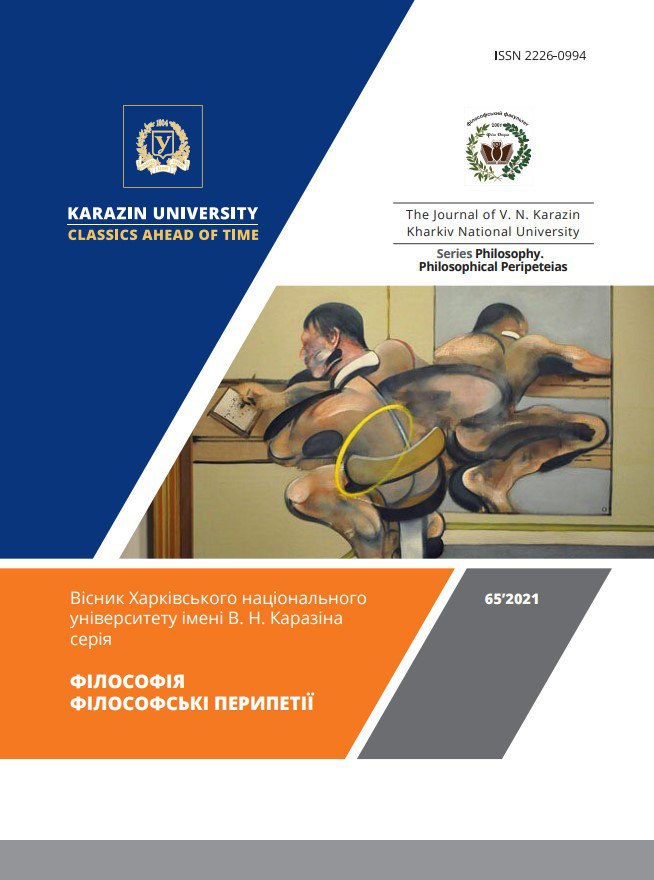MORAL PHILOSOPHY OF T. ADORNO: FROM CRITICAL THEORY TO MODERN PRACTICAL PHILOSOPHY
Abstract
The task of philosophy according to Adorno is comprehension of universality and normativity. In spite of conceptual thinking debunked in negative philosophy, Adorno remains devoted to modernity project. His original philosophical thinking adherent to modernity presents an interesting constellation of ethical ideas, concepts of moral philosophy, around which a certain model of practical rationality can be constructed. The purpose of this article is the construction of practical philosophy of Adorno. Ideas of his essays on morality are analyzed in the perspective of normativity foundations of critical theory from the first generation of Frankfurt School to discourse ethics and contemporary critical philosophy. The author outlines the divergence between Adorno’s philosophy and discourse ethics in the matter of justification of normativity implemented in formal procedure of communication. Following Kant’s foundation of morality Adorno provides a richer account of controversies which are subject of contemporary critical theory. Adorno’s thinking elucidates the ambiguity of universality in the concept of “inner dialectic of morality”. He rejects the abstract morality and reveals its repressive features. Instead he puts the concept of humanity in the center of his examination. Morality defined as law and equality, justified by procedure of reasoning appears abstract. In contrast Adorno draws attention to moral impulse which invokes moral deed. Dialectic of morality unfolds in the opposition of impulse, solidarity, affection towards others on the one hand, and autonomy and equality underlying external side of moral law – on the other. Thus individuality modus is the source of morality while abstract formalism of universalism is avoided on the basis of reflection of morality with ethical virtues of critical thinking, humility and affection. Moral principles stand for theoretical aspect and justification of normativity, impulsion concerns application of morality. Thus the problem of contradiction of universalism and contextualism is elucidated through reconciliation of right as moral law and ethical good.
Downloads
References
Adorno T. (2000). Problems of moral philosophy. Transl.from German by Khorkov M.L. M.: Respublica. (In Russian).
Adorno T. (2003). Negative dialectic. M.: Nauchniy myr. (In Russian).
Soloviiova G. (2010). Philosophy of suffering and hope. Almaty. (In Russian).
Habermas. J. (2003). Philosophical discourse of Modernity. M.: ed. Ves myr. (In Russian).
Adorno, Theodor W. (2005). Critical Models: Interventions and Catchwords. Trans. Henry W. Pickford (New York: Columbia University Press).
Benhabib S. (1986). Critique, Norm, and Utopia: A Study of the Foundations of Critical Theory. New York, Columbia University Press.
Cook, D. (2020). Adorno, Kant and Enlightenment. Kantian Review, 25(4), 541-557. doi: 10.1017/s1369415420000400
Finlayson, J.G. (2002), Adorno on the Ethical and the Ineffable. European Journal of Philosophy, 10: 1-25. doi: 10.1111/1468-0378.00147
Freyenhagen, F. (2013). Adorno's Practical Philosophy: Living Less Wrongly. Cambridge University Press.
Habermas, J. (1983). Theodor Adorno: The Primal History of Subjectivity – Self-Affirmation gone wild. Jurgen Habermas. Philosophical-Political Profiles, translated by Frederick G. Lawrence, Heinemann, London.
Menke, C. (2004). Genealogy and Critique: Two Forms of Ethical Questioning of Morality. In T. Huhn (Ed.), The Cambridge Companion to Adorno (Cambridge Companions to Philosophy, pp. 302-327).
Schweppenhäuser, G. (2004). Adorno’s Negative Moral Philosophy. In T. Huhn (Ed.), The Cambridge Companion to Adorno (Cambridge Companions to Philosophy, pp. 328-353).
Copyright (c) 2021 Софія Леонтьєва

This work is licensed under a Creative Commons Attribution 4.0 International License.
Authors who publish with this journal agree to the following terms:
- Authors retain copyright and grant the journal right of first publication of this work under the terms of a license Creative Commons Attribution License 4.0 International (CC BY 4.0).
- Authors are able to enter into separate, additional contractual arrangements for the non-exclusive distribution of the journal's published version of the work (e.g., post it to an institutional repository or publish it in a book), with an acknowledgement of its initial publication in this journal.
- Authors are permitted and encouraged to post their work online (e.g., in institutional repositories or on their website) prior to and during the submission process, as it can lead to productive exchanges, as well as earlier and greater citation of published work.






3.gif)




